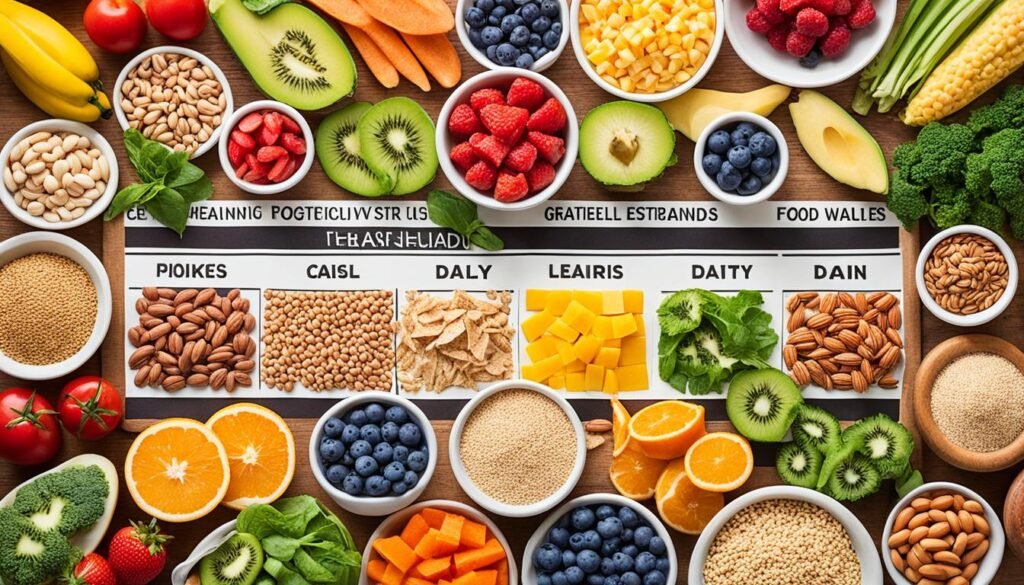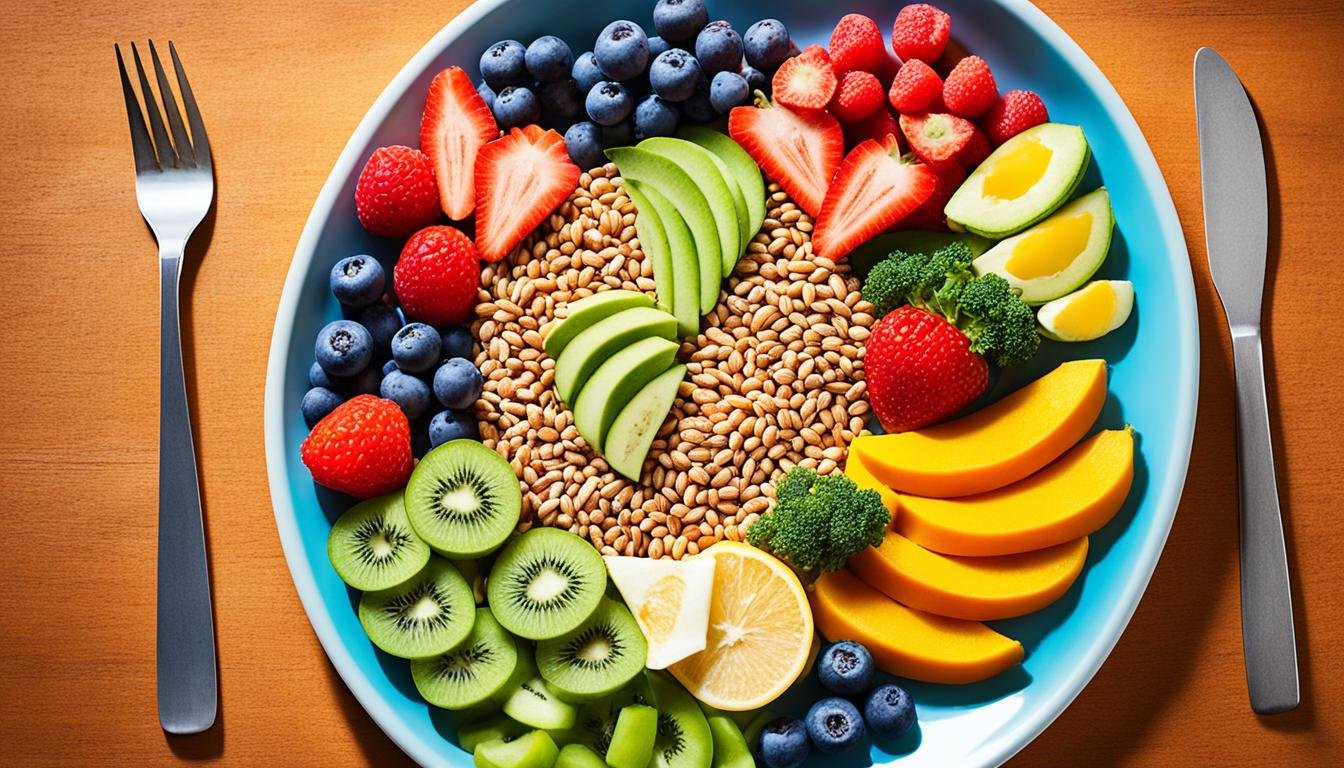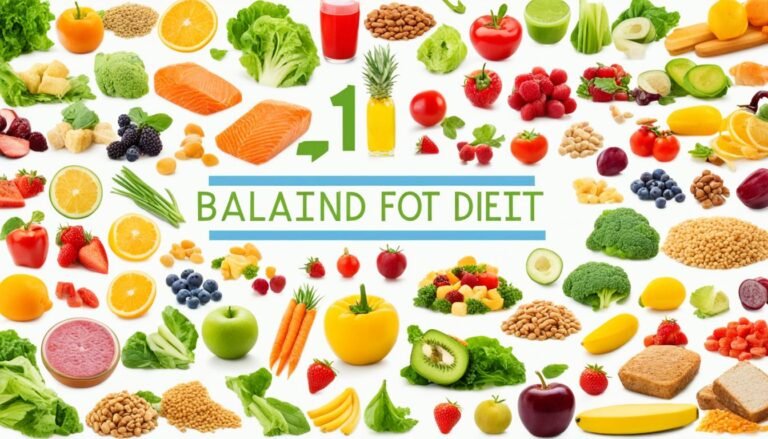What foods should I eat every day?
At breakfast, I often question if I’m giving my body the right fuel. With all the changing dietary advice, figuring out a “balanced diet” can feel tough. However, the secret to energy and good health might be simpler than expected.
It’s important to eat a wide range of nutrient-dense foods for overall health. The Eatwell Guide is a great tool. It shows you which food groups to focus on and how much to eat for a balanced diet. Following these recommendations and including plenty of healthy, whole foods in your meals helps ensure you get all the nutrients you need. Doing so can lead to a healthier life.
Key Takeaways
- A balanced diet is essential for maintaining good health and feeling your best.
- The Eatwell Guide outlines the key food groups and recommended servings for a nutritious eating plan.
- Consuming a diverse array of nutrient-dense foods can help you meet your body’s dietary needs.
- Prioritizing whole, unprocessed foods is crucial for optimal nutrition and well-being.
- Incorporating a variety of fruits, vegetables, whole grains, proteins, and healthy fats into your daily meals is recommended.
Importance of a Balanced Diet
Eating right is crucial for staying healthy. When you eat a variety of nutrient-dense foods in the right amounts, your body thanks you. It gets the vitamins, minerals, and healthy fats it needs. This keeps your body ticking properly. It helps you fight off illnesses and lowers your risk of things like heart disease.
Maintaining Good Health
Eating a balanced diet is like giving your body its daily fuel. You need a mix of foods to work at your best. Doing this supports everything from helping your organs to keeping your bones strong.
Consuming the Right Proportions
Getting the right mix of foods is important. You want to eat a bit of everything. The Eatwell Guide is a good start. It helps you see what a balanced plate should look like.
Meeting Dietary Needs
A balanced diet is your ticket to getting all the right nutrients. It ensures your body works right every day. This boosts your health in the long run.
The Eatwell Guide: Food Groups
The Eatwell Guide helps us plan for a balanced diet. It shows us which food groups to focus on and how much to eat. Following its advice means you’ll enjoy a wide range of nutrient-dense foods that your body needs.
Fruits and Vegetables (5 A Day)
Fruits and veggies should be big part of what you eat, more than a third each day. Try to eat at least 5 portions. They’re rich in vitamins, minerals, and antioxidants for good health. Mix fresh, frozen, or canned types in your meals to hit this target.
Starchy Foods
Don’t forget about starchy foods in your meals, like whole grains. They give energy, fiber, and key nutrients. Choices such as brown rice, quinoa, and whole-wheat bread offer many benefits.
Dairy and Alternatives
Dairy products are essential for your diet, as are dairy-free options. They bring protein and calcium for strong bones. Include milk, yogurt, or their alternatives daily for good health.
Proteins (Beans, Pulses, Fish, Eggs, Meat)
Proteins are key for our bodies, and there’s a lot to choose from. You can get them from plants (like beans and soy) or animals (like fish and eggs). Eating a mix supports your muscles and health overall.
Healthy Fats and Oils
Focus on healthy fats and oils over bad ones. These can be found in avocados, nuts, and olive oil. They help with brain function, lower inflammation, and keep your skin and hair healthy.
Fluids
Drinking enough fluids, mostly water, is vital for your health. It helps your body work well, stay at the right temperature, and keeps your mind sharp.

What Foods Should I Eat Every Day?
Eating certain foods every day can help you stay healthy. Fish, especially kinds like salmon, have omega-3 fatty acids. These are great for your heart and brain.
Cruciferous vegetables like broccoli and kale are loaded with good stuff. They have glucosinolates, which may lower your chance of cancer and help your immune system.
Leafy greens, for example, spinach, give you important vitamins and minerals. They also have lutein and zeaxanthin, which are good for your eyes. Adding these greens to your meals daily is a smart move for your health.
Colorful berries and antioxidant-rich fruits like blueberries and mangoes are full of fiber and antioxidants. Enjoying these fruits often boosts your immune system and cuts down on body inflammation.

Nutrient-Dense Superfoods
It’s key to eat a mix of nutrient-dense “superfoods” every day. These foods are full of vitamins, minerals, and antioxidants. They offer various health benefits too.
Eggs (Protein, Lutein, and Zeaxanthin)
High-quality protein is in eggs, along with lutein and zeaxanthin for your eyes’ health. Adding eggs to your meals helps with protein and keeps you healthy.
Sweet Potatoes (Vitamin A, Antioxidants)
Sweet potatoes are rich in Vitamin A and antioxidants. These nutrients protect your cells and lower the risk of diseases when eaten regularly.
Oats (Fiber, Whole Grains)
Oats are a solid whole grain choice for dietary fiber. They boost your gut health and keep you feeling full. Including oats in your diet is an easy way to get your whole grain intake.
Nuts and Seeds (Healthy Fats, Magnesium)
Nuts and seeds have healthy fats and are packed with important nutrients. They help your heart and are a good source of magnesium, vital for many body functions.
Citrus Fruits (Vitamin C)
Oranges and grapefruits are high in vitamin C, which boosts your immune system. Eating these fruits daily ensures you get enough vitamin C for your body.
Yogurt (Probiotics, Calcium)
Yogurt is full of probiotics that keep your gut healthy. It also offers calcium for your bones and teeth. Including yogurt in your diet is beneficial in many ways.
Portion Control and Moderation
Eating right is more than just healthy food choices. It also means watching how much you eat and what types. When you eat less of saturated fats, added sugars, and sodium, you lower your risk of health problems. These include heart disease, stroke, and type 2 diabetes.
Limiting Saturated Fats, Sugar, and Salt
Our bodies need fats, sugars, and salts but too much is harmful. Try to cut back on saturated fats. Pick lean proteins, healthy oils, and low-fat dairy. Watch out for added sugars in processed foods. Choose natural sweeteners and whole options. And keep an eye on your sodium intake. Read labels, skip processed foods, and use herbs and spices for flavor.
Choosing Whole, Unprocessed Foods
Eating whole, unprocessed foods is better for you than processed. Fruits, veggies, whole grains, and lean meats are full of vitamins and fiber. They’re much healthier than processed foods, which often have too much sugar and bad fats. Making these whole foods the main part of every meal helps your health a lot.
Staying Hydrated
Drinking enough water is key to feeling your best. It helps your body in many ways, like keeping it cool and helping your organs work right. Make sure to drink lots of fluids each day. Water, unsweetened tea, and flavored water are all good choices.
Conclusion
Eating a balanced, nutrient-packed diet is key to staying healthy and feeling good. The Eatwell Guide can help. It suggests eating a mix of healthy, dense foods for every meal and snack. Doing this lowers your chances of getting sick. It also advises on what to cut back on, like bad fats and too much sugar or salt.
This approach can boost your energy, improve your health, and even help you live longer. It’s all about following the Eatwell Guide, making healthy eating a habit, and hitting your daily nutrition goals. These steps lead to better health and well-being over time.
Focusing on a varied, nutritious diet is vital for your well-being. Use the Eatwell Guide to guide your food choices. This way, your body and mind will be well taken care of.






